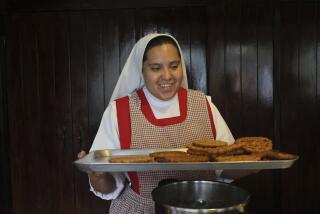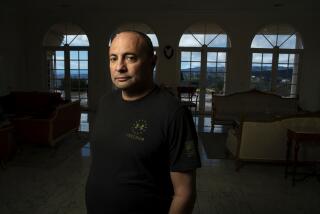Freedom to Worship . . . and Make Money : Soviet Union: <i> Perestroika</i> is an economic tool for some enterprising church groups.
MAIKOP, Soviet Union — When the Communists controlled the Dekor Brick Co., workers were paid 80 rubles a month (about $13.34). But since the Baptists took over, they make nearly four times as much.
That’s enough, says Alex Esaullko, foreman in the giant ovens where the bricks are dried, for his family of six to live on, “since I have a cow and some chickens. . . . And working conditions are much better than before.”
The Baptists’ brick-making plant and a related furniture factory demonstrate that religious liberty in the Soviet Union now goes beyond freedom to worship without government restriction: Perestroika is also becoming an economic tool for some enterprising church groups.
The goal of this unusual Baptist venture is not only better wages, housing and worker benefits; it’s also to make money for a church project.
Here in the progressive southern area of the country near the northern shore of the Black Sea, several dozen laymen, mostly members of the Evangelical Christian Baptist Church of Maikop, have pooled capital and harnessed techniques of private enterprise to turn a profit. In turn, they are using the funds to establish a Bible college and gain a controlling interest in a new commercial bank.
“Brothers, we are walking here on a ground of gold, and we are just beginning to be able to reach down and pick it up,” exulted Nicolai Cherinkov, financial director of the brick and furniture businesses and manager of Logos, the just-opened resident Bible school. “We could be a richer land than America--if we can only continue freely.”
Cherinkov and his associates realize that is a big “if”: The prospects for this new-found wedding of faith and the market economy are at the mercy of the tenuous Soviet economic and political systems.
A former senior U.S. official, Robert Hormats of Goldman Sachs and Co., has spoken of the “probability of economic chaos in the Soviet Union this winter.” Analysts also say many factories and farmers are refusing to accept what they see as worthless Soviet rubles for their products, insisting instead on barter deals.
Nonetheless, the new Christian enterprises in Maikop, a city of 160,000, are a sign of hope, especially to the workers--50 of whom are church members. The factory management has built six new low-cost housing units for worker families and runs a co-op where they can buy food at reduced prices. Workers are also allowed for the first time to observe religious holidays.
Meanwhile, the typical Soviet who works for the state earns 180 rubles a month, compared to Dekor Brick Co.’s 300-ruble average.
“Even nonbelievers trust us and are hoping we’ll make it,” observed Cherinkov.
The intertwined projects had their genesis several years ago. Baptists in Maikop (one of the few areas of the Soviet Union where Protestants are more numerous than active Russian Orthodox who predominate in most parts of the country) gathered together and decided to acquire a wood shop to make furniture moldings.
“I could have been a manager with a good position in the Party,” said Alexander Filev, one of the Baptist organizers. “But when they asked me, ‘Are you a Communist?’ I said, ‘No, I’m a Baptist.’ Because I’m a Christian, I couldn’t be a manager or a leader, only a simple worker.
“But there was a good market for wood products, and little (wood-working) Christian collectives had been springing up in the underground.”
So the Baptist entrepreneurs obtained contracts with larger furniture fabrication firms in major cities and rented a state-built wood shop from the government. The group also rented the adjoining decrepit 25-year-old brick factory from the state. Slowly, they modernized it and have improved its efficiency so that it turns out 15,000 bricks a day.
Still, according to entrepreneur-partner Paul Drobov, the brick operation makes no profit because only the government can buy the bricks and has set the price at 90 rubles per thousand. Yet it costs the company 125 rubles to produce 1,000 bricks.
Enter capitalistic ingenuity: The state permits the furniture moldings to be sold at the free-market price; thus that operation generates a healthy profit on 2 million rubles’ worth of annual contracts. And, because the brick division of Dekor loses money, the company pays a total of only 3% in taxes on both operations rather than the 30% that would be required on the furniture factory if it were a separate entity. So, Dekor’s net income is higher, despite the brick-making losses.
Then there is the new Communist Landowners Bank, formerly a government bank. New Soviet laws are allowing commercial banks to be formed because of “transference to a market economy,” explained bank manager Nadegeda Parshukova. “We are preparing ourselves to live and work like you,” she added, nodding toward several American visitors.
Of the seven partner-firms in the bank, Dekor Co. has the most money on deposit and thus, according to the bank bylaws, the largest voice in its management. Chairing the bank’s board of directors is Eugene Filev, a central figure in Dekor and the Soviet Baptist church.
The final piece in the Baptist conglomerate is the Bible school, which is also a child of perestroika .
For years, Logos has operated a biblical-theological program, based in Fresno, to train young Soviet Christians through extension courses. Last May, however, the organization teamed up with the Soviet business leaders to sign a lease-purchase agreement for a former Communist youth camp on an abandoned collective farm in Belorechensk, a town about 30 miles south of Maikop.
The new Logos Bible Institute, one of the first resident Bible programs in Russia, is welcoming about 100 Soviet students who are beginning classes in buildings freshly painted this fall. Up to 40 of them will soon move into a renovated dormitory on campus.
Each session will concentrate for seven weeks on theology. And for three weeks, noted Cherinkov, flashing a broad gold-toothed grin, on business principles.
More to Read
Sign up for Essential California
The most important California stories and recommendations in your inbox every morning.
You may occasionally receive promotional content from the Los Angeles Times.










